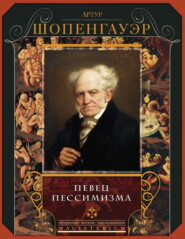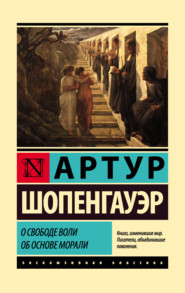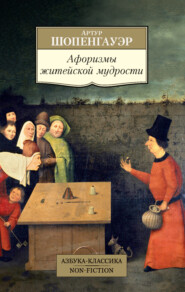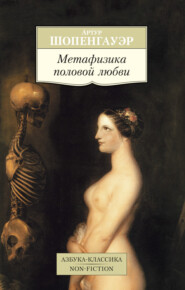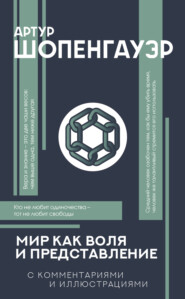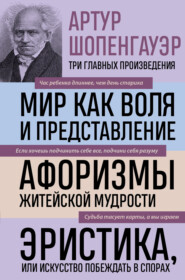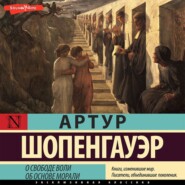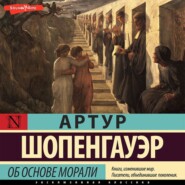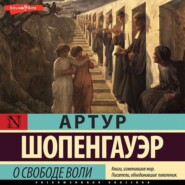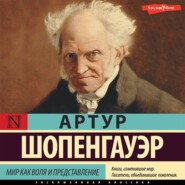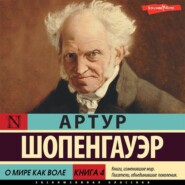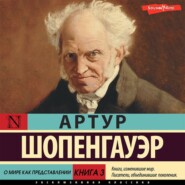По всем вопросам обращайтесь на: info@litportal.ru
(©) 2003-2024.
✖
Essays of Schopenhauer
Настройки чтения
Размер шрифта
Высота строк
Поля
Demop. Then that of the medical profession would be, Fiant pilulae, et pereat mundus, which would be the easiest to carry out.
Phil. Heaven forbid! Everything must be taken cum grano salis.
Demop. Exactly; and it is just for that reason that I want you to accept religion cum grano salis, and to see that the needs of the people must be met according to their powers of comprehension. Religion affords the only means of proclaiming and making the masses of crude minds and awkward intelligences, sunk in petty pursuits and material work, feel the high import of life. For the ordinary type of man, primarily, has no thought for anything else but what satisfies his physical needs and longings, and accordingly affords him a little amusement and pastime. Founders of religion and philosophers come into the world to shake him out of his torpidity and show him the high significance of existence: philosophers for the few, the emancipated; founders of religion for the many, humanity at large. For φιλοσοφον πληθος ἀδυνατον εἰναι, as your friend Plato has said, and you should not forget it. Religion is the metaphysics of the people, which by all means they must keep; and hence it must be eternally respected, for to discredit it means taking it away. Just as there is popular poetry, popular wisdom in proverbs, so too there must be popular metaphysics; for mankind requires most certainly an interpretation of life, and it must be in keeping with its power of comprehension. So that this interpretation is at all times an allegorical investiture of the truth, and it fulfils, as far as practical life and our feelings are concerned – that is to say, as a guidance in our affairs, and as a comfort and consolation in suffering and death – perhaps just as much as truth itself could, if we possessed it. Don't be hurt at its unpolished, baroque, and apparently absurd form, for you, with your education and learning, cannot imagine the roundabout ways that must be used in order to make people in their crude state understand deep truths. The various religions are only various forms in which the people grasp and understand the truth, which in itself they could not grasp, and which is inseparable from these forms. Therefore, my dear fellow, don't be displeased if I tell you that to ridicule these forms is both narrow-minded and unjust.
Phil. But is it not equally narrow-minded and unjust to require that there shall be no other metaphysics but this one cut out to meet the needs and comprehension of the people? that its teachings shall be the boundary of human researches and the standard of all thought, so that the metaphysics of the few, the emancipated, as you call them, must aim at confirming, strengthening, and interpreting the metaphysics of the people? That is, that the highest faculties of the human mind must remain unused and undeveloped, nay, be nipped in the bud, so that their activity may not thwart the popular metaphysics? And at bottom are not the claims that religion makes just the same? Is it right to have tolerance, nay, gentle forbearance, preached by what is intolerance and cruelty itself? Let me remind you of the heretical tribunals, inquisitions, religious wars and crusades, of Socrates' cup of poison, of Bruno's and Vanini's death in the flames. And is all this to-day something belonging to the past? What can stand more in the way of genuine philosophical effort, honest inquiry after truth, the noblest calling of the noblest of mankind, than this conventional system of metaphysics invested with a monopoly from the State, whose principles are inculcated so earnestly, deeply, and firmly into every head in earliest youth as to make them, unless the mind is of miraculous elasticity, become ineradicable? The result is that the basis of healthy reasoning is once and for all deranged – in other words, its feeble capacity for thinking for itself, and for unbiassed judgment in regard to everything to which it might be applied, is for ever paralysed and ruined.
Demop, Which really means that the people have gained a conviction which they will not give up in order to accept yours in its place.
Phil. Ah! if it were only conviction based on insight, one would then be able to bring forward arguments and fight the battle with equal weapons. But religions admittedly do not lend themselves to conviction after argument has been brought to bear, but to belief as brought about by revelation. The capacity for belief is strongest in childhood; therefore one is most careful to take possession of this tender age. It is much more through this than through threats and reports of miracles that the doctrines of belief take root. If in early childhood certain fundamental views and doctrines are preached with unusual solemnity and in a manner of great earnestness, the like of which has never been seen before, and if, too, the possibility of a doubt about them is either completely ignored or only touched upon in order to show that doubt is the first step to everlasting perdition; the result is that the impression will be so profound that, as a rule, that is to say in almost every case, a man will be almost as incapable of doubting the truth of those doctrines as he is of doubting his own existence. Hence it is scarcely one in many thousands that has the strength of mind to honestly and seriously ask himself – is that true? Those who are able to do this have been more appropriately styled strong minds, esprits forts, than is imagined. For the commonplace mind, however, there is nothing so absurd or revolting but what, if inoculated in this way, the firmest belief in it will take root. If, for example, the killing of a heretic or an infidel were an essential matter for the future salvation of the soul, almost every one would make it the principal object of his life, and in dying get consolation and strength from the remembrance of his having succeeded; just as, in truth, in former times almost every Spaniard looked upon an auto da fé as the most pious of acts and one most pleasing to God.
We have an analogy to this in India in the Thugs, a religious body quite recently suppressed by the English, who executed numbers of them. They showed their regard for religion and veneration for the goddess Kali by assassinating at every opportunity their own friends and fellow-travellers, so that they might obtain their possessions, and they were seriously convinced that thereby they had accomplished something that was praiseworthy and would contribute to their eternal welfare. The power of religious dogma, that has been inculcated early, is so great that it destroys conscience, and finally all compassion and sense of humanity. But if you wish to see with your own eyes, and close at hand, what early inoculation of belief does, look at the English. Look at this nation, favoured by nature before all others, endowed before all others with reason, intelligence, power of judgment, and firmness of character; look at these people degraded, nay, made despicable among all others by their stupid ecclesiastical superstition, which among their other capacities appears like a fixed idea, a monomania. For this they have to thank the clergy in whose hands education is, and who take care to inculcate all the articles, of belief at the earliest age in such a way as to result in a kind of partial paralysis of the brain; this then shows itself throughout their whole life in a silly bigotry, making even extremely intelligent and capable people among them degrade themselves so that they become quite an enigma to us. If we consider how essential to such a masterpiece is inoculation of belief in the tender age of childhood, the system of missions appears no longer merely as the height of human importunity, arrogance, and impertinence, but also of absurdity; in so far as it does not confine itself to people who are still in the stage of childhood, such as the Hottentots, Kaffirs, South Sea Islanders, and others like them, among whom it has been really successful. While, on the other hand, in India the Brahmans receive the doctrines of missionaries either with a smile of condescending approval or refuse them with a shrug of their shoulders; and among these people in general, notwithstanding the most favourable circumstances, the missionaries' attempts at conversion are usually wrecked. An authentic report in vol. xxi. of the Asiatic Journal of 1826 shows that after so many years of missionary activity in the whole of India (of which the English possessions alone amount to one hundred and fifteen million inhabitants) there are not more than three hundred living converts to be found; and at the same time it is admitted that the Christian converts are distinguished for their extreme immorality. There are only three hundred venal and bribed souls out of so many millions. I cannot see that it has gone better with Christianity in India since then, although the missionaries are now trying, contrary to agreement, to work on the children's minds in schools exclusively devoted to secular English instruction, in order to smuggle in Christianity, against which, however, the Hindoos are most jealously on their guard. For, as has been said, childhood is the time, and not manhood, to sow the seeds of belief, especially where an earlier belief has taken root. An acquired conviction, however, that is assumed by matured converts serves, generally, as only the mask for some kind of personal interest. And it is the feeling that this could hardly be otherwise that makes a man, who changes his religion at maturity, despised by most people everywhere; a fact which reveals that they do not regard religion as a matter of reasoned conviction but merely as a belief inoculated in early childhood, before it has been put to any test. That they are right in looking at religion in this way is to be gathered from the fact that it is not only the blind, credulous masses, but also the clergy of every religion, who, as such, have studied its sources, arguments, dogmas and differences, who cling faithfully and zealously as a body to the religion of their fatherland; consequently it is the rarest thing in the world for a priest to change from one religion or creed to another. For instance, we see that the Catholic clergy are absolutely convinced of the truth of all the principles of their Church, and that the Protestants are also of theirs, and that both defend the principles of their confession with like zeal. And yet the conviction is the outcome merely of the country in which each is born: the truth of the Catholic dogma is perfectly clear to the clergy of South Germany, the Protestant to the clergy of North Germany. If, therefore, these convictions rest on objective reasons, these reasons must be climatic and thrive like plants, some only here, some only there. The masses everywhere, however, accept on trust and faith the convictions of those who are locally convinced.
Demop. That doesn't matter, for essentially it makes no difference. For instance, Protestantism in reality is more suited to the north, Catholicism to the south.
Phil. So it appears. Still, I take a higher point of view, and have before me a more important object, namely, the progress of the knowledge of truth among the human race. It is a frightful condition of things that, wherever a man is born, certain propositions are inculcated in his earliest youth, and he is assured that under penalty of forfeiting eternal salvation he may never entertain any doubt about them; in so far, that is, as they are propositions which influence the foundation of all our other knowledge and accordingly decide for ever our point of view, and if they are false, upset it for ever. Further, as the influences drawn from these propositions make inroads everywhere into the entire system of our knowledge, the whole of human knowledge is through and through affected by them. This is proved by every literature, and most conspicuously by that of the Middle Age, but also, in too great an extent, by that of the fifteenth and sixteenth centuries. We see how paralysed even the minds of the first rank of all those epochs were by such false fundamental conceptions; and how especially all insight into the true substance and working of Nature was hemmed in on every side. During the whole of the Christian period Theism lay like a kind of oppressive nightmare on all intellectual effort, and on philosophical effort in particular, hindering and arresting all progress. For the men of learning of those epochs, God, devil, angels, demons, hid the whole of Nature; no investigation was carried out to the end, no matter sifted to the bottom; everything that was beyond the most obvious causal nexus was immediately attributed to these; so that, as Pomponatius expressed himself at the time, Certe philosophi nihil verisimile habent ad haec, quare necesse est, ad Deum, ad angelos et daemones recurrere. It is true that there is a suspicion of irony in what this man says, as his malice in other ways is known, nevertheless he has expressed the general way of thinking of his age. If any one, on the other hand, possessed that rare elasticity of mind which alone enabled him to free himself from the fetters, his writings, and he himself with them, were burnt; as happened to Bruno and Vanini. But how absolutely paralysed the ordinary mind is by that early metaphysical preparation may be seen most strikingly, and from its most ridiculous side, when it undertakes to criticise the doctrines of a foreign belief. One finds the ordinary man, as a rule, merely trying to carefully prove that the dogmas of the foreign belief do not agree with those of his own; he labours to explain that not only do they not say the same, but certainly do not mean the same thing as his. With that he fancies in his simplicity that he has proved the falsity of the doctrines of the alien belief. It really never occurs to him to ask the question which of the two is right; but his own articles of belief are to him as à priori certain principles. The Rev. Mr. Morrison has furnished an amusing example of this kind in vol. xx. of the Asiatic Journal wherein he criticises the religion and philosophy of the Chinese.
Demop. So that's your higher point of view. But I assure you that there is a higher still. Primum vivere, deinde philosophari is of more comprehensive significance than one supposes at first sight. Before everything else, the raw and wicked tendencies of the masses ought to be restrained, in order to protect them from doing anything that is extremely unjust, or committing cruel, violent, and disgraceful deeds. If one waited until they recognised and grasped the truth one would assuredly come too late. And supposing they had already found truth, it would surpass their powers of comprehension. In any case it would be a mere allegorical investiture of truth, a parable, or a myth that would be of any good to them. There must be, as Kant has said, a public standard of right and virtue, nay, this must at all times flutter high. It is all the same in the end what kind of heraldic figures are represented on it, if they only indicate what is meant. Such an allegorical truth is at all times and everywhere, for mankind at large, a beneficial substitute for an eternally unattainable truth, and in general, for a philosophy which it can never grasp; to say nothing of its changing its form daily, and not having as yet attained any kind of general recognition. Therefore practical aims, my good Philalethes, have in every way the advantage of theoretical.
Phil. This closely resembles the ancient advice of Timaeus of Locrus, the Pythagorean: τας ψυχας ἀπειργομες ψευδεσι λογοις, εἰ κα μη ἀγηται ἀλαθεσι.[13 - De Anim. Mundi, p. 104, d. Steph.] And I almost suspect that it is your wish, according to the fashion of to-day, to remind me —
"Good friend, the time is near
When we may feast off what is good in peace."
And your recommendation means that we should take care in time, so that the waves of the dissatisfied, raging masses may not disturb us at table. But the whole of this point of view is as false as it is nowadays universally liked and praised; this is why I make haste to put in a protest against it. It is false that state, justice, and law cannot be maintained without the aid of religion and its articles of belief, and that justice and police regulations need religion as a complement in order to carry out legislative arrangements. It is false if it were repeated a hundred times. For the ancients, and especially the Greeks, furnish us with striking instantia in contrarium founded on fact. They had absolutely nothing of what we understand by religion. They had no sacred documents, no dogma to be learnt, and its acceptance advanced by every one, and its principles inculcated early in youth. The servants of religion preached just as little about morals, and the ministers concerned themselves very little about any kind of morality or in general about what the people either did or left undone. No such thing. But the duty of the priests was confined merely to temple ceremonies, prayers, songs, sacrifices, processions, lustrations, and the like, all of which aimed at anything but the moral improvement of the individual. The whole of their so-called religion consisted, and particularly in the towns, in some of the deorum majorum gentium having temples here and there, in which the aforesaid worship was conducted as an affair of state, when in reality it was an affair of police. No one, except the functionaries engaged, was obliged in any way to be present, or even to believe in it. In the whole of antiquity there is no trace of any obligation to believe in any kind of dogma. It was merely any one who openly denied the existence of the gods or calumniated them that was punished; because by so doing he insulted the state which served these gods; beyond this every one was allowed to think what he chose of them. If any one wished to win the favour of these gods privately by prayer or sacrifice he was free to do so at his own cost and risk; if he did not do it, no one had anything to say against it, and least of all the State. Every Roman had his own Lares and Penates at home, which were, however, at bottom nothing more than the revered portraits of his ancestors. The ancients had no kind of decisive, clear, and least of all dogmatically fixed ideas about the immortality of the soul and a life hereafter, but every one in his own way had lax, vacillating, and problematical ideas; and their ideas about the gods were just as various, individual, and vague. So that the ancients had really no religion in our sense of the word. Was it for this reason that anarchy and lawlessness reigned among them? Is not law and civil order rather so much their work, that it still constitutes the foundation of ours? Was not property perfectly secure, although it consisted of slaves for the greater part? And did not this condition of things last longer than a thousand years?
So I cannot perceive, and must protest against the practical aims and necessity of religion in the sense which you have indicated, and in such general favour to-day, namely, as an indispensable foundation of all legislative regulations. For from such a standpoint the pure and sacred striving after light and truth, to say the least, would seem quixotic and criminal if it should venture in its feeling of justice to denounce the authoritative belief as a usurper who has taken possession of the throne of truth and maintained it by continuing the deception.
Demop. But religion is not opposed to truth; for it itself teaches truth. Only it must not allow truth to appear in its naked form, because its sphere of activity is not a narrow auditory, but the world and humanity at large, and therefore it must conform to the requirements and comprehension of so great and mixed a public; or, to use a medical simile, it must not present it pure, but must as a medium make use of a mythical vehicle. Truth may also be compared in this respect to certain chemical stuffs which in themselves are gaseous, but which for official uses, as also for preservation or transmission, must be bound to a firm, palpable base, because they would otherwise volatilise. For example, chlorine is for all such purposes applied only in the form of chlorides. But if truth, pure, abstract, and free from anything of a mythical nature, is always to remain unattainable by us all, philosophers included, it might be compared to fluorine, which cannot be presented by itself alone, but only when combined with other stuffs. Or, to take a simpler simile, truth, which cannot be expressed in any other way than by myth and allegory, is like water that cannot be transported without a vessel; but philosophers, who insist upon possessing it pure, are like a person who breaks the vessel in order to get the water by itself. This is perhaps a true analogy. At any rate, religion is truth allegorically and mythically expressed, and thereby made possible and digestible to mankind at large. For mankind could by no means digest it pure and unadulterated, just as we cannot live in pure oxygen but require an addition of four-fifths of nitrogen. And without speaking figuratively, the profound significance and high aim of life can only be revealed and shown to the masses symbolically, because they are not capable of grasping life in its real sense; while philosophy should be like the Eleusinian mysteries, for the few, the elect.
Phil. I understand. The matter resolves itself into truth putting on the dress of falsehood. But in doing so it enters into a fatal alliance. What a dangerous weapon is given into the hands of those who have the authority to make use of falsehood as the vehicle of truth! If such is the case, I fear there will be more harm caused by the falsehood than good derived from the truth. If the allegory were admitted to be such, I should say nothing against it; but in that case it would be deprived of all respect, and consequently of all efficacy. Therefore the allegory must assert a claim, which it must maintain, to be true in sensu proprio while at the most it is true in sensu allegorico. Here lies the incurable mischief, the permanent evil; and therefore religion is always in conflict, and always will be with the free and noble striving after pure truth.
Demop. Indeed, no. Care has been taken to prevent that. If religion may not exactly admit its allegorical nature, it indicates it at any rate sufficiently.
Phil. And in what way does it do that?
Demop. In its mysteries. Mystery is at bottom only the theological terminus technicus for religious allegory. All religions have their mysteries. In reality, a mystery is a palpably absurd dogma which conceals in itself a lofty truth, which by itself would be absolutely incomprehensible to the ordinary intelligence of the raw masses. The masses accept it in this disguise on trust and faith, without allowing themselves to be led astray by its absurdity, which is palpable to them; and thereby they participate in the kernel of the matter so far as they are able. I may add as an explanation that the use of mystery has been attempted even in philosophy; for example, when Pascal, who was pietest, mathematician, and philosopher in one, says in this threefold character: God is everywhere centre and nowhere periphery. Malebranche has also truly remarked, La liberté est un mystère. One might go further, and maintain that in religions everything is really mystery. For it is utterly impossible to impart truth in sensu proprio to the multitude in its crudity; it is only a mythical and allegorical reflection of it that can fall to its share and enlighten it. Naked truth must not appear before the eyes of the profane vulgar; it can only appear before them closely veiled. And it is for this reason that it is unfair to demand of a religion that it should be true in sensu proprio, and that, en passant. Rationalists and Supernaturalists of to-day are so absurd. They both start with the supposition that religion must be the truth; and while the former prove that it is not, the latter obstinately maintain that it is; or rather the former cut up and dress the allegory in such a way that it could be true in sensu proprio but would in that case become a platitude. The latter wish to maintain, without further dressing, that it is true in sensu proprio, which, as they should know, can only be carried into execution by inquisitions and the stake. While in reality, myth and allegory are the essential elements of religion, but under the indispensable condition (because of the intellectual limitations of the great masses) that it supplies enough satisfaction to meet those metaphysical needs of mankind which are ineradicable, and that it takes the place of pure philosophical truth, which is infinitely difficult, and perhaps never attainable.
Phil. Yes, pretty much in the same way as a wooden leg takes the place of a natural one. It supplies what is wanting, does very poor service for it, and claims to be regarded as a natural leg, and is more or less cleverly put together. There is a difference, however, for, as a rule, the natural leg was in existence before the wooden one, while religion everywhere has gained the start of philosophy.
Demop. That may be; but a wooden leg is of great value to those who have no natural leg. You must keep in view that the metaphysical requirements of man absolutely demand satisfaction; because the horizon of his thoughts must be defined and not remain unlimited. A man, as a rule, has no faculty of judgment for weighing reasons, and distinguishing between what is true and what is false. Moreover, the work imposed upon him by nature and her requirements leaves him no time for investigations of that kind, or for the education which they presuppose. Therefore it is entirely out of the question to imagine he will be convinced by reasons; there is nothing left for him but belief and authority. Even if a really true philosophy took the place of religion, at least nine-tenths of mankind would only accept it on authority, so that it would be again a matter of belief; for Plato's φιλοσοφον πληθος ἀδυνατον εἰναι will always hold good. Authority, however, is only established by time and circumstances, so that we cannot bestow it on that which has only reason to commend it; accordingly, we must grant it only to that which has attained it in the course of history, even if it is only truth represented allegorically. This kind of truth, supported by authority, appeals directly to the essentially metaphysical temperament of man – that is, to his need of a theory concerning the riddle of existence, which thrusts itself upon him, and arises from the consciousness that behind the physical in the world there must be a metaphysical, an unchangeable something, which serves as the foundation of constant change. It also appeals to the will, fears, and hopes of mortals living in constant need; religion provides them with gods, demons, to whom they call, appease, and conciliate. Finally, it appeals to their moral consciousness, which is undeniably present, and lends to it that authenticity and support from without – a support without which it would not easily maintain itself in the struggle against so many temptations. It is exactly from this side that religion provides an inexhaustible source of consolation and comfort in the countless and great sorrows of life, a comfort which does not leave men in death, but rather then unfolds its full efficacy. So that religion is like some one taking hold of the hand of a blind person and leading him, since he cannot see for himself; all that the blind person wants is to attain his end, not to see everything as he walks along.
Phil. This side is certainly the brilliant side of religion. If it is a fraus it is indeed a pia fraus; that cannot be denied. Then priests become something between deceivers and moralists. For they dare not teach the real truth, as you yourself have quite correctly explained, even if it were known to them; which it is not. There can, at any rate, be a true philosophy, but there can be no true religion: I mean true in the real and proper understanding of the word, not merely in that flowery and allegorical sense which you have described, a sense in which every religion would be true only in different degrees. It is certainly quite in harmony with the inextricable admixture of good and evil, honesty and dishonesty, goodness and wickedness, magnanimity and baseness, which the world presents everywhere, that the most important, the most lofty, and the most sacred truths can make their appearance only in combination with a lie, nay, can borrow strength from a lie as something that affects mankind more powerfully; and as revelation must be introduced by a lie. One might regard this fact as the monogram of the moral world. Meanwhile let us not give up the hope that mankind will some day attain that point of maturity and education at which it is able to produce a true philosophy on the one hand, and accept it on the other. Simplex sigillum veri: the naked truth must be so simple and comprehensible that one can impart it to all in its true form without any admixture of myth and fable (a pack of lies) – in other words, without masking it as religion.
Demop. You have not a sufficient idea of the wretched capacities of the masses.
Phil. I express it only as a hope; but to give it up is impossible. In that case, if truth were in a simpler and more comprehensible form, it would surely soon drive religion from the position of vicegerent which it has so long held. Then religion will have fulfilled her mission and finished her course; she might then dismiss the race which she has guided to maturity and herself retire in peace. This will be the euthanasia of religion. However, as long as she lives she has two faces, one of truth and one of deceit. According as one looks attentively at one or the other one will like or dislike her. Hence religion must be regarded as a necessary evil, its necessity resting on the pitiful weak-mindedness of the great majority of mankind, incapable of grasping the truth, and consequently when in extremity requires a substitute for truth.
Demop. Really, one would think that you philosophers had truth lying in readiness, and all that one had to do was to lay hold of it.
Phil. If we have not got it, it is principally to be ascribed to the pressure under which philosophy, at all periods and in all countries, has been held by religion. We have tried to make not only the expression and communication of truth impossible, but even the contemplation and discovery of it, by giving the minds of children in earliest childhood into the hands of priests to be worked upon; to have the groove in which their fundamental thoughts are henceforth to run so firmly imprinted, as in principal matters, to become fixed and determined for a lifetime. I am sometimes shocked to see when I take into my hand the writings of even the most intelligent minds of the sixteenth and seventeenth centuries, and especially if I have just left my oriental studies, how paralysed and hemmed in on all sides they are by Jewish notions. Prepared in this way, one cannot form any idea of the true philosophy!
Demop. And if, moreover, this true philosophy were discovered, religion would not cease to exist, as you imagine. There cannot be one system of metaphysics for everybody; the natural differences of intellectual power in addition to those of education make this impossible. The great majority of mankind must necessarily be engaged in that arduous bodily labour which is requisite in order to furnish the endless needs of the whole race. Not only does this leave the majority no time for education, for learning, or for reflection; but by virtue of the strong antagonism between merely physical and intellectual qualities, much excessive bodily labour blunts the understanding and makes it heavy, clumsy, and awkward, and consequently incapable of grasping any other than perfectly simple and palpable matters. At least nine-tenths of the human race comes under this category. People require a system of metaphysics, that is, an account of the world and our existence, because such an account belongs to the most natural requirements of mankind. They require also a popular system of metaphysics, which, in order for it to be this, must combine many rare qualities; for instance, it must be exceedingly lucid, and yet in the right places be obscure, nay, to a certain extent, impenetrable; then a correct and satisfying moral system must be combined with its dogmas; above everything, it must bring inexhaustible consolation in suffering and death. It follows from this that it can only be true in sensu allegorico and not in sensu proprio. Further, it must have the support of an authority which is imposing by its great age, by its general recognition, by its documents, together with their tone and statements – qualities which are so infinitely difficult to combine that many a man, if he stopped to reflect, would not be so ready to help to undermine a religion, but would consider it the most sacred treasure of the people. If any one wants to criticise religion he should always bear in mind the nature of the great masses for which it is destined, and picture to himself their complete moral and intellectual inferiority. It is incredible how far this inferiority goes and how steadily a spark of truth will continue to glimmer even under the crudest veiling of monstrous fables and grotesque ceremonies, adhering indelibly, like the perfume of musk, to everything which has come in contact with it. As an illustration of this, look at the profound wisdom which is revealed in the Upanishads, and then look at the mad idolatry in the India of to-day, as is revealed in its pilgrimages, processions, and festivities, or at the mad and ludicrous doings of the Saniassi of the present time. Nevertheless, it cannot be denied that in all this madness and absurdity there yet lies something that is hidden from view, something that is in accordance with, or a reflection of the profound wisdom that has been mentioned. It requires this kind of dressing-up for the great brute masses. In this antithesis we have before us the two poles of humanity: – the wisdom of the individual and the bestiality of the masses, both of which, however, find their point of harmony in the moral kingdom. Who has not thought of the saying from the Kurral – "Vulgar people look like men; but I have never seen anything like them." The more highly cultured man may always explain religion to himself cum grano salis; the man of learning, the thoughtful mind, may, in secret, exchange it for a philosophy. And yet one philosophy would not do for everybody; each philosophy by the laws of affinity attracts a public to whose education and mental capacities it is fitted. So there is always an inferior metaphysical system of the schools for the educated plebeians, and a higher system for the élite. Kant's lofty doctrine, for example, was degraded to meet the requirements of the schools, and ruined by Fries, Krug, Salat, and similar people. In short, Goethe's dictum is as applicable here as anywhere: One does not suit all. Pure belief in revelation and pure metaphysics are for the two extremes; and for the intermediate steps mutual modifications of both in countless combinations and gradations. The immeasurable differences which nature and education place between men have made this necessary.
Phil. This point of view reminds me seriously of the mysteries of the ancients which you have already mentioned; their aim at bottom seems to have lain in remedying the evil arising out of the differences of mental capacities and education. Their plan was to single out of the great multitude a few people, to whom the unveiled truth was absolutely incomprehensible, and to reveal the truth to them up to a certain point; then out of these they singled out others to whom they revealed more, as they were able to grasp more; and so on up to the Epopts. And so we got μικρα, και μειζονα, και μεγιστα μυστηρια. The plan was based on a correct knowledge of the intellectual inequality of mankind.
Demop. To a certain extent the education in our lower, middle, and high schools represents the different forms of initiation into the mysteries.
Phil. Only in a very approximate way, and this only in so far as subjects of higher knowledge were written about exclusively in Latin. But since that has ceased to be so all the mysteries are profaned.
Demop. However that may be, I wish to remind you, in speaking of religion, that you should grasp it more from the practical and less from the theoretical side. Personified metaphysics may be religion's enemy, yet personified morality will be its friend. Perhaps the metaphysics in all religions is false; but the morality in all is true. This is to be surmised from the fact that in their metaphysics they contradict each other, while in their morality they agree.
Phil. Which furnishes us with a proof of the rule of logic, that a true conclusion may follow from false premises.
Demop. Well, stick to your conclusion, and be always mindful that religion has two sides. If it can't stand when looked at merely from the theoretical – in other words, from its intellectual side, it appears, on the other hand, from the moral side as the only means of directing, training, and pacifying those races of animals gifted with reason, whose kinship with the ape does not exclude a kinship with the tiger. At the same time religion is, in general, a sufficient satisfaction for their dull metaphysical needs. You appear to me to have no proper idea of the difference, wide as the heavens apart, of the profound breach between your learned man, who is enlightened and accustomed to think, and the heavy, awkward, stupid, and inert consciousness of mankind's beasts of burden, whose thoughts have taken once and for all the direction of fear about their maintenance, and cannot be put in motion in any other; and whose muscular power is so exclusively exercised that the nervous power which produces intelligence is thereby greatly reduced. People of this kind must absolutely have something that they can take hold of on the slippery and thorny path of their life, some sort of beautiful fable by means of which things can be presented to them which their crude intelligence could most certainly only understand in picture and parable. It is impossible to approach them with subtle explanations and fine distinctions. If you think of religion in this way, and bear in mind that its aims are extremely practical and only subordinately theoretical, it will seem to you worthy of the highest respect.
Phil. A respect which would finally rest on the principle that the end sanctifies the means. However, I am not in favour of a compromise on a basis of that sort. Religion may be an excellent means of curbing and controlling the perverse, dull, and malicious creatures of the biped race; in the eyes of the friend of truth every fraus, be it ever so pia, must be rejected. It would be an odd way to promote virtue through the medium of lies and deception. The flag to which I have sworn is truth. I shall remain faithful to it everywhere, and regardless of success, I shall fight for light and truth. If I see religion hostile, I shall —
Demop. But you will not! Religion is not a deception; it is true, and the most important of all truths. But because, as has already been said, its doctrines are of such a lofty nature that the great masses cannot grasp them immediately; because, I say, its light would blind the ordinary eye, does it appear concealed in the veil of allegory and teach that which is not exactly true in itself, but which is true according to the meaning contained in it: and understood in this way religion is the truth.
Phil. That would be very probable, if it were allowed to be true only in an allegorical sense. But it claims to be exactly true, and true in the proper sense of the word: herein lies the deception, and it is here that the friend of truth must oppose it.
Demop. But this deception is a conditio sine qua non. If religion admitted that it was merely the allegorical meaning in its doctrines that was true, it would be deprived of all efficacy, and such rigorous treatment would put an end to its invaluable and beneficial influence on the morals and feelings of mankind. Instead of insisting on that with pedantic obstinacy, look at its great achievements in a practical way both as regards morality and feelings, as a guide to conduct, as a support and consolation to suffering humanity in life and death. How greatly you should guard against rousing suspicion in the masses by theoretical wrangling, and thereby finally taking from them what is an inexhaustible source of consolation and comfort to them; which in their hard lot they need very much more than we do: for this reason alone, religion ought not to be attacked.
Phil. With this argument Luther could have been beaten out of the field when he attacked the selling of indulgences; for the letters of indulgence have furnished many a man with irreparable consolation and perfect tranquillity, so that he joyfully passed away with perfect confidence in the little packet of them which he firmly held in his hand as he lay dying, convinced that in them he had so many cards of admission into all the nine heavens. What is the use of grounds of consolation and peacefulness over which is constantly hanging the Damocles-sword of deception? The truth, my friend, the truth alone holds good, and remains constant and faithful; it is the only solid consolation; it is the indestructible diamond.
Demop. Yes, if you had truth in your pocket to bless us with whenever we asked for it. But what you possess are only metaphysical systems in which nothing is certain but the headaches they cost. Before one takes anything away one must have something better to put in its place.
Phil. I wish you would not continually say that. To free a man from error does not mean to take something from him, but to give him something. For knowledge that something is wrong is a truth. No error, however, is harmless; every error will cause mischief sooner or later to the man who fosters it. Therefore do not deceive any one, but rather admit you are ignorant of what you do not know, and let each man form his own dogmas for himself. Perhaps they will not turn out so bad, especially as they will rub against each other and mutually rectify errors; at any rate the various opinions will establish tolerance. Those men who possess both knowledge and capacity may take up the study of philosophy, or even themselves advance the history of philosophy.
Demop. That would be a fine thing! A whole nation of naturalised metaphysicians quarrelling with each other, and eventualiter striking each other.
Phil. Well, a few blows here and there are the sauce of life, or at least a very slight evil compared with priestly government – prosecution of heretics, plundering of the laity, courts of inquisition, crusades, religious wars, massacres of St. Bartholomew, and the like. They have been the results of chartered popular metaphysics: therefore I still hold that one cannot expect to get grapes from thistles, or good from lies and deception.
Demop. How often must I repeat that religion is not a lie, but the truth itself in a mythical, allegorical dress? But with respect to your plan of each man establishing his own religion, I had still something to say to you, that a particularism like this is totally and absolutely opposed to the nature of mankind, and therefore would abolish all social order. Man is an animal metaphysicum– in other words, he has surpassingly great metaphysical requirements; accordingly he conceives life above all in its metaphysical sense, and from that standpoint wishes to grasp everything. Accordingly, odd as it may sound with regard to the uncertainty of all dogmas, accord in the fundamental elements of metaphysics is the principal thing, in so much as it is only among people who hold the same views on this question that a genuine and lasting fellowship is possible. As a result of this, nations resemble and differ from each other more in religion than in government, or even language. Consequently, the fabric of society, the State, will only be perfectly firm when it has for a basis a system of metaphysics universally acknowledged. Such a system, naturally, can only be a popular metaphysical one – that is, a religion. It then becomes identified with the government, with all the general expressions of the national life, as well as with all sacred acts of private life. This was the case in ancient India, among the Persians, Egyptians, Jews, also the Greeks and Romans, and it is still the case among the Brahman, Buddhist, and Mohammedan nations. There, are three doctrines of faith in China, it is true, and the one that has spread the most, namely, Buddhism, is exactly the doctrine that is least protected by the State; yet there is a saying in China that is universally appreciated and daily applied, the three doctrines are only one– in other words, they agree in the main thing. The Emperor confesses all three at the same time, and agrees with them all. Europe is the confederacy of Christian States; Christianity is the basis of each of its members and the common bond of all; hence Turkey, although it is in Europe, is really not to be reckoned in it. Similarly the European princes are such "by the grace of God," and the Pope is the delegate of God; accordingly, as his throne was the highest, he wished all other thrones to be looked upon only as held in fee from him. Similarly Archbishops and Bishops, as such, had temporal authority, just as they have still in England a seat and voice in the Upper House; Protestant rulers are, as such, heads of their churches; in England a few years ago this was a girl of eighteen. By the revolt from the Pope, the Reformation shattered the European structure, and, in particular, dissolved the true unity of Germany by abolishing its common faith; this unity, which had as a matter of fact come to grief, had accordingly to be replaced later by artificial and purely political bonds. So you see how essentially connected is unity of faith with common order and every state. It is everywhere the support of the laws and the constitution – that is to say, the foundation of the social structure, which would stand with difficulty if faith did not lend power to the authority of the government and the importance of the ruler.
Phil. Oh, yes, princes look upon God as a goblin, wherewith to frighten grown-up children to bed when nothing else is of any avail; it is for this reason that they depend so much on God. All right; meanwhile I should like to advise every ruling lord to read through, on a certain day every six months, the fifteenth chapter of the First Book of Samuel, earnestly and attentively; so that he may always have in mind what it means to support the throne on the altar. Moreover, since burning at the stake, that ultima ratio theologorum, is a thing of the past, this mode of government has lost its efficacy. For, as you know, religions are like glowworms: before they can shine it must be dark. A certain degree of general ignorance is the condition of every religion, and is the element in which alone it is able to exist. While, as soon as astronomy, natural science, geology, history, knowledge of countries and nations have spread their light universally, and philosophy is finally allowed to speak, every faith which is based on miracle and revelation must perish, and then philosophy will take its place. In Europe the day of knowledge and science dawned towards the end of the fifteenth century with the arrival of the modern Greek philosophers, its sun rose higher in the sixteenth and seventeenth centuries, which were so productive, and scattered the mists of the Middle Age. In the same proportion, both Church and Faith were obliged to gradually disappear; so that in the eighteenth century English and French philosophers became direct antagonists, until finally, under Frederick the Great, Kant came and took away from religious belief the support it had formerly received from philosophy, and emancipated the ancilla theologiae in that he attacked the question with German thoroughness and perseverance, whereby it received a less frivolous, that is to say, a more earnest tone. As a result of this we see in the nineteenth century Christianity very much weakened, almost stripped entirely of serious belief, nay, fighting for its own existence; while apprehensive princes try to raise it up by an artificial stimulant, as the doctor tries to revive a dying man by the aid of a drug. There is a passage from Condorcet's Des Progrès de l'esprit humain, which seems to have been written as a warning to our epoch: Le zèle religieux des philosophes et des grands n'était qu'une dévotion politique: et toute religion, qu'on se permet de défendre comme une croyance qu'il est utile de laisser au peuple, ne peut plus espérer qu'une agonie plus ou moins prolongée. In the whole course of the events which I have pointed out you may always observe that belief and knowledge bear the same relation to each other as the two scales of a balance: when the one rises the other must fall. The balance is so sensitive that it indicates momentary influences. For example, in the beginning of this century the predatory excursions of French robbers under their leader Buonaparte, and the great efforts that were requisite to drive them out and to punish them, had led to a temporary neglect of science, and in consequence to a certain decrease in the general propagation of knowledge; the Church immediately began to raise her head again and Faith to be revived, a revival partly of a poetical nature, in keeping with the spirit of the times. On the other hand, in the more than thirty years' peace that followed, leisure and prosperity promoted the building up of science and the spread of knowledge in an exceptional degree, so that the result was what I have said, the dissolution and threatened fall of religion. Perhaps the time which has been so often predicted is not far distant, when religion will depart from European humanity, like a nurse whose care the child has outgrown; it is now placed in the hands of a tutor for instruction. For without doubt doctrines of belief that are based only on authority, miracles, and revelation are only of use and suitable to the childhood of humanity. That a race, which all physical and historical data confirm as having been in existence only about a hundred times the life of a man sixty years old, is still in its first childhood is a fact that every one will admit.
Demop. If instead of prophesying with undisguised pleasure the downfall of Christianity, you would only consider how infinitely indebted European humanity is to it, and to the religion which, after the lapse of some time, followed Christianity from its old home in the East! Europe received from it a drift which had hitherto been unknown to it – it learnt the fundamental truth that life cannot be an end-in-itself, but that the true end of our existence lies beyond it. The Greeks and Romans had placed this end absolutely in life itself, so that, in this sense, they may most certainly be called blind heathens. Correspondingly, all their virtues consist in what is serviceable to the public, in what is useful; and Aristotle says quite naïvely, "Those virtues must necessarily be the greatest which are the most useful to others" (ἀναγκη δε μεγιστας εἰναι ἀρετας τας τοις ἀλλοις χρησιμωτατας, Rhetor. I. c. 9). This is why the ancients considered love for one's country the greatest virtue, although it is a very doubtful one, as it is made up of narrowness, prejudice, vanity, and an enlightened self-interest. Preceding the passage that has just been quoted, Aristotle enumerates all the virtues in order to explain them individually. They are Justice, Courage, Moderation, Magnificence (μεγαλοπρεπεια), Magnanimity, Liberality, Gentleness, Reasonableness, and Wisdom. How different from the Christian virtues! Even Plato, without comparison the most transcendental philosopher of pre-Christian antiquity, knows no higher virtue than Justice; he alone recommends it unconditionally and for its own sake, while all the other philosophers make a happy life —vita beata– the aim of all virtue; and it is acquired through the medium of moral behaviour. Christianity released European humanity from its superficial and crude absorption in an ephemeral, uncertain, and hollow existence.
… coelumque tueri Jussit, et
erectos ad sidera tollere vultus.
Accordingly, Christianity does not only preach Justice, but the Love of Mankind, Compassion, Charity, Reconciliation, Love of one's Enemies, Patience, Humility, Renunciation, Faith, and Hope. Indeed, it went even further: it taught that the world was of evil and that we needed deliverance; consequently it preached contempt of the world, self-denial, chastity, the giving up of one's own will, that is to say, turning away from life and its phantom-like pleasures; it taught further the healing power of suffering, and that an instrument of torture is the symbol of Christianity, I willingly admit that this serious and only correct view of life had spread in other forms throughout Asia thousands of years previously, independently of Christianity as it is still; but this view of life was a new and tremendous revelation to European humanity. For it is well known that the population of Europe consists of Asiatic races who, driven out from their own country, wandered away, and by degrees hit upon Europe: on their long wanderings they lost the original religion of their homes, and with it the correct view of life; and this is why they formed in another climate religions for themselves which were somewhat crude; especially the worship of Odin, the Druidic and the Greek religions, the metaphysical contents of which were small and shallow. Meanwhile there developed among the Greeks a quite special, one might say an instinctive, sense of beauty, possessed by them alone of all the nations of the earth that have ever existed – a peculiar, fine, and correct sense of beauty, so that in the mouths of their poets and in the hands of their artists, their mythology took an exceptionally beautiful and delightful form. On the other hand, the earnest, true, and profound import of life was lost to the Greeks and Romans; they lived like big children until Christianity came and brought them back to the serious side of life.
Phil. And to form an idea of the result we need only compare antiquity with the Middle Age that followed – that is, the time of Pericles with the fourteenth century. It is difficult to believe that we have the same kind of beings before us. There, the finest development of humanity, excellent constitutional regulations, wise laws, cleverly distributed offices, rationally ordered freedom, all the arts, as well as poetry and philosophy, at their best; the creation of works which after thousands of years have never been equalled and are almost works of a higher order of beings, whom we can never approach; life embellished by the noblest fellowship, as is portrayed in the Banquet of Xenophon. And now look at this side, if you can. Look at the time when the Church had imprisoned the minds, and violence the bodies of men, whereby knights and priests could lay the whole weight of life on the common beast of burden – the third estate. There you have club-law, feudalism, and fanaticism in close alliance, and in their train shocking uncertainty and darkness of mind, a corresponding intolerance, discord of faiths, religious wars, crusades, persecution of heretics and inquisitions; as the form of fellowship, chivalry, an amalgam of savagery and foolishness, with its pedantic system of absurd affectations, its degrading superstitions, and apish veneration for women; the survival of which is gallantry, deservedly requited by the arrogance of women; it affords to all Asiatics continual material for laughter, in which the Greeks would have joined. In the golden Middle Age the matter went as far as a formal and methodical service of women and enjoined deeds of heroism, cours d'amour, bombastic Troubadour songs and so forth, although it is to be observed that these last absurdities, which have an intellectual side, were principally at home in France; while among the material phlegmatic Germans the knights distinguished themselves more by drinking and robbing. Drinking and hoarding their castles with plunder were the occupations of their lives; and certainly there was no want of stupid love-songs in the courts. What has changed the scene so? Migration and Christianity.
Demop. It is a good thing you reminded me of it. Migration was the source of the evil, and Christianity the dam on which it broke. Christianity was the means of controlling and taming those raw, wild hordes who were washed in by the flood of migration. The savage man must first of all learn to kneel, to venerate, and to obey; it is only after that, that he can be civilised. This was done in Ireland by St. Patrick, in Germany by Winifred the Saxon, who was a genuine Boniface. It was migration of nations, this last movement of Asiatic races towards Europe, followed only by their fruitless attempts under Attila, Gengis Khan, and Timur, and, as a comic after-piece, by the gipsies: it was migration of nations which swept away the humanity of the ancients. Christianity was the very principle which worked against this savagery, just as later, through the whole of the Middle Age, the Church and its hierarchy were extremely necessary to place a limit to the savagery and barbarism of those lords of violence, the princes and knights: it was the ice-breaker of this mighty flood. Still, the general aim of Christianity is not so much to make this life pleasant as to make us worthy of a better. It looks beyond this span of time, this fleeting dream, in order to lead us to eternal salvation. Its tendency is ethical in the highest sense of the word, a tendency which had hitherto been unknown in Europe; as I have already pointed out to you by comparing the morality and religion of the ancients with those of Christianity.






